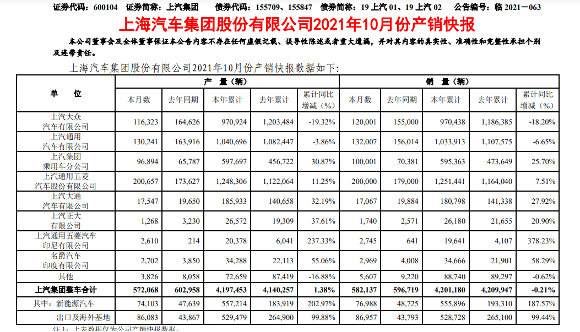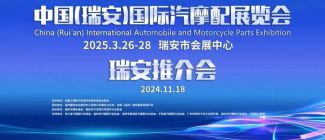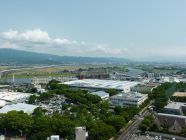Recently, SAIC Group released a production and sales report for October 2021.
In October 2021, SAIC Motor produced 572,100 complete vehicles in October, down 5.12% year-on-year; and sold 582,100 complete vehicles, down 2.44% year-on-year. From January to October, the Group produced a total of 4,197,500 vehicles, a slight increase of 1.38% year-on-year; cumulative sales of 4,201,200 vehicles, a slight decrease of 0.21% year-on-year.

The double drop in production and sales of SAIC Volkswagen was the main reason that dragged down SAIC's overall performance. Data show that in October 2021, SAIC Volkswagen's vehicle output was 116,300, a year-on-year decline of 29.34%; sales volume was 120,000, a year-on-year decline of 22.58%. From January to October, the company produced a total of 970,900 vehicles, a year-on-year decrease of 19.32%; cumulative sales of 970,400 vehicles, a year-on-year decrease of 18.2%.
Due to the shortage of key raw materials such as chips, SAIC Volkswagen’s sales performance has shown a significant decline this year, especially in June and July when sales were cut in half. However, relying on its long-term accumulated market size advantage, SAIC Volkswagen still maintains a high share in the Chinese auto market. Its October sales and cumulative sales this year are second only to FAW-Volkswagen.
As an important source of profit for the group, the decline in production and sales of SAIC Volkswagen has largely affected SAIC's overall financial performance. In the third quarter of 2021, SAIC Group's operating income fell by 13.5% compared with the same period last year, and the net profit attributable to shareholders of listed companies fell by 14.75%, which has a lot to do with the sluggish performance of the joint venture sector, especially SAIC Volkswagen.
In fact, as early as December last year, there were rumors that SAIC Volkswagen began to suspend production on December 4 due to insufficient chip supply, and FAW-Volkswagen also entered a state of suspension from the beginning of this month. In response, Volkswagen China responded that the limited supply of chips is not as serious as the rumors, and the company is seeking solutions to coordinate responses, and customer delivery of related vehicles has not been affected.
Entering April 2021, media reports once again stated that the production of a number of SAIC Volkswagen’s main models will be suspended due to a “shortage of cores”. In this regard, SAIC Volkswagen said that in the first quarter of this year, SAIC Volkswagen’s production capacity was affected by the shortage of chips, and some models did have phased out of production. The company is paying close attention to developments, optimizing production scheduling plans based on market demand, and giving priority to ensuring the production capacity of products with greater market demand. Volkswagen and Volkswagen China are coordinating with suppliers around the world to optimize resource allocation as much as possible, hoping to fill this gap in the coming months.
Volkswagen CEO Herbert Diess (Herbert Diess) recently stated that the supply of automotive chips in the fourth quarter will be "much better" than before, and the shortage will be alleviated quarter by quarter next year. This means that the chip shortage problem that has plagued SAIC Volkswagen for a year is expected to be alleviated, and the gap caused by the year-on-year decline in production and sales may be filled.
In addition to being affected by the global “shortage of cores”, SAIC Volkswagen is also in a transitional period and its sales performance is being tested under the industry background of the rise of its own brands and the acceleration of the transition to new energy.
Data shows that in 2020, before the emergence of the “core shortage” crisis, SAIC Volkswagen’s annual cumulative retail sales fell by 20.3% year-on-year to 1,568,007 vehicles. The decline was not only higher than the market average, but also far less than FAW-Volkswagen’s positive year-on-year growth. 1.2% performance. Negative events such as the break of the A-pillar when the Passat China Insurance Institute crashed and the deformation of the A-pillar in the Tiguan L China Insurance Institute crash test once caused consumers to question the quality and safety of SAIC Volkswagen’s products. In addition, the insufficiently competitive Skoda brand has become a major weakness of SAIC Volkswagen. In the case of many car companies this year due to a lack of cores and no cars to sell, Skoda has once exceeded the red line of stocks due to its backlog, and is gradually falling into the fringe of the auto market.
In terms of new energy, the Volkswagen ID. series of pure electric vehicles experienced a low period of monthly sales of more than 1,000 vehicles in the early days of the market. However, in the second half of this year, as the sales network of the "agent system model" spread, the sales of this model based on the Volkswagen MEB pure electric platform began to rise. In September 2021, the delivery volume of the Volkswagen ID. family was 10,126, a quarter-on-quarter increase of 272%. Among them, the sales of SAIC Volkswagen ID.4 X/ID.6 X were 3293 and 1,708 respectively. In October, the delivery volume of Volkswagen ID. series broke 10,000 again, reaching 12,736 vehicles, of which SAIC Volkswagen ID.3 delivered 1255 vehicles in the first week of its launch.
According to media reports, with the launch of ID.3 products, SAIC Volkswagen’s ID brand has established a dedicated team for operation, which will open up core links such as “brand-user-terminal-service” and strengthen APP operations to achieve more efficient and accurate Digitization drives the operating model. This means that SAIC Volkswagen will adjust its new energy vehicle business, so that its operation and sales model will be closer to the new forces of car-making, to cater to the needs of users.
Some insiders believe that the gradual increase of ID. series models has relieved SAIC Volkswagen’s pressure on transformation to a certain extent. However, compared to "Wei Xiaoli", Aian, BYD and other independent brands with a single hot-selling model, the ID. series models currently on sale by SAIC Volkswagen are not enough to support its further opening of the new energy vehicle market. On the one hand, under SAIC Volkswagen’s traditional management mechanism, the transformation of new energy vehicle business is facing greater resistance, especially conflicts of interest with dealers; secondly, SAIC Volkswagen’s new energy products have a limited degree of localization. The experience of supplementing energy and other aspects is difficult to compare with the self-owned brands of the roots. Although SAIC Volkswagen has achieved rapid growth in sales by virtue of its existing brand reputation and market scale advantages, it still faces greater challenges to become the top of the new energy vehicle market.
Notice on Holding the Rui'an Promotion Conference for the 2025 China (Rui'an) International Automobile and Motorcycle Parts Exhibition
On September 5th, we invite you to join us at the Wenzhou Auto Parts Exhibition on a journey to trace the origin of the Auto Parts City, as per the invitation from the purchaser!
Hot Booking | AAPEX 2024- Professional Exhibition Channel for Entering the North American Auto Parts Market
The wind is just right, Qianchuan Hui! Looking forward to working with you at the 2024 Wenzhou Auto Parts Exhibition and composing a new chapter!
Live up to Shaohua | Wenzhou Auto Parts Exhibition, these wonderful moments are worth remembering!
Bridgestone exits Russia and sells assets to S8 Capital
Free support line!
Email Support!
Working Days/Hours!





